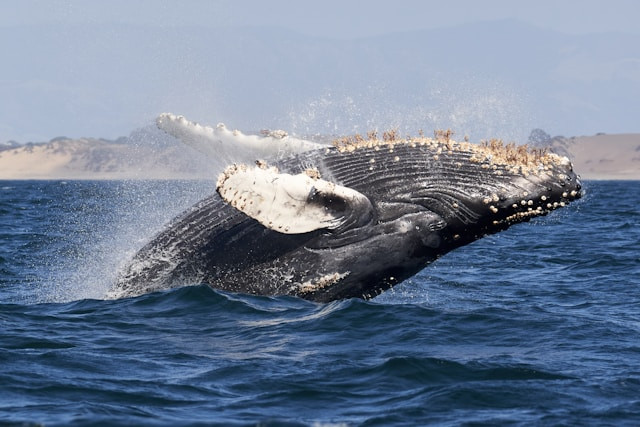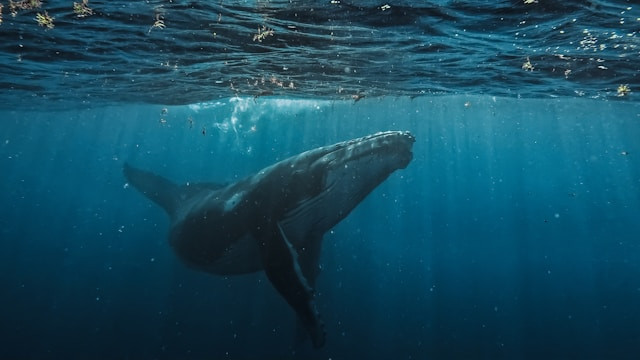Can we truly communicate with animals in their own language? What if the key to understanding alien intelligence lies in our oceans?
These questions might seem like the stuff of science fiction, but a groundbreaking experiment by scientists from the SETI Institute, UC Davis, and the Alaska Whale Foundation has brought us closer to finding answers.
In a remarkable 20-minute interaction, these researchers engaged in a conversation with a humpback whale named Twain. They responded to her calls in a way that suggested a form of mutual understanding. Could this extraordinary event not only deepen our connection with Earth’s creatures but also pave the way for future conversations with extraterrestrial beings?
The 20-Minute Conversation With Whale
This groundbreaking study, published in the journal PeerJ, marks the first documented instance of humans and humpback whales exchanging signals in the whales’ natural communication style.
The researchers utilized a pre-recorded “contact call,” a common type of social call used by humpback whales to greet or locate each other. The call was played through underwater speakers, prompting Twain to approach the boat and respond with her own vocalizations.
Over a span of 20 minutes, Twain matched the intervals of the calls played by the scientists, even adjusting the frequency of her responses, indicating a form of interactive communication.

Dr. Brenda McCowan of UC Davis, the lead author of the study, stated, “We believe this is the first such communicative exchange between humans and humpback whales in the humpback ‘language.'”
The interaction demonstrated a behavior known as “behavioral synchrony,” which is associated with social bonding and group cohesion among whales.
Implications for Extraterrestrial Communication
While the primary focus of the research was to explore whale communication, the study also has implications for the search for extraterrestrial intelligence. Scientists believe that understanding how whales interact with humans can provide valuable insights into how to communicate with potential extraterrestrial beings.
Laurance Doyle, a principal investigator at the SETI Institute and co-author of the paper, noted, “An important assumption of the search for extraterrestrial intelligence is that extraterrestrials will be interested in making contact and so target human receivers. This important assumption is certainly supported by the behavior of humpback whales.”
The research team aims to develop “intelligence filters” to detect and interpret signals from other forms of life. They are drawing parallels between the whales’ responses and potential alien communication. This involves identifying intelligent signals within the vast array of data collected from space. This is a task that requires fine-tuning based on understanding communication patterns among intelligent species on Earth.
The Significance of Whale Intelligence

Humpback whales, known scientifically as Megaptera novaeangliae, are among the most intelligent creatures on Earth. They possess large brains with specialized regions for processing auditory information. It enables them to communicate over long distances through their songs and social calls. These traits make them an excellent proxy for studying non-human intelligence.
Dr. Fred Sharpe of the Alaska Whale Foundation highlighted the whales’ complex social systems and tool-making abilities, such as using bubble nets to catch fish, as indicators of their high intelligence. The study’s findings could also extend to other intelligent species, such as dolphins, meerkats, elephants, and certain carnivores.
A Future Beyond Earth
The successful communication with Twain also serves as a potential model for future interactions with extraterrestrial beings. The study underscores the importance of exploring and understanding the diverse intelligences present on our own planet as a stepping stone toward making contact with life beyond Earth.

This research on whale communication represents a crucial step in developing the tools and methodologies needed to detect and interpret intelligent signals from the cosmos. The knowledge gained from studying Earth’s most intelligent species will undoubtedly enrich our understanding of communication across different forms of life.
The 20-minute conversation with Twain the humpback whale is a landmark achievement in both marine biology and the search for extraterrestrial intelligence. As we continue to explore the mysteries of the universe, studies like this remind us that the journey begins with understanding the wonders of our own world.
You may also like: Decoding the Secret Language of Whales



